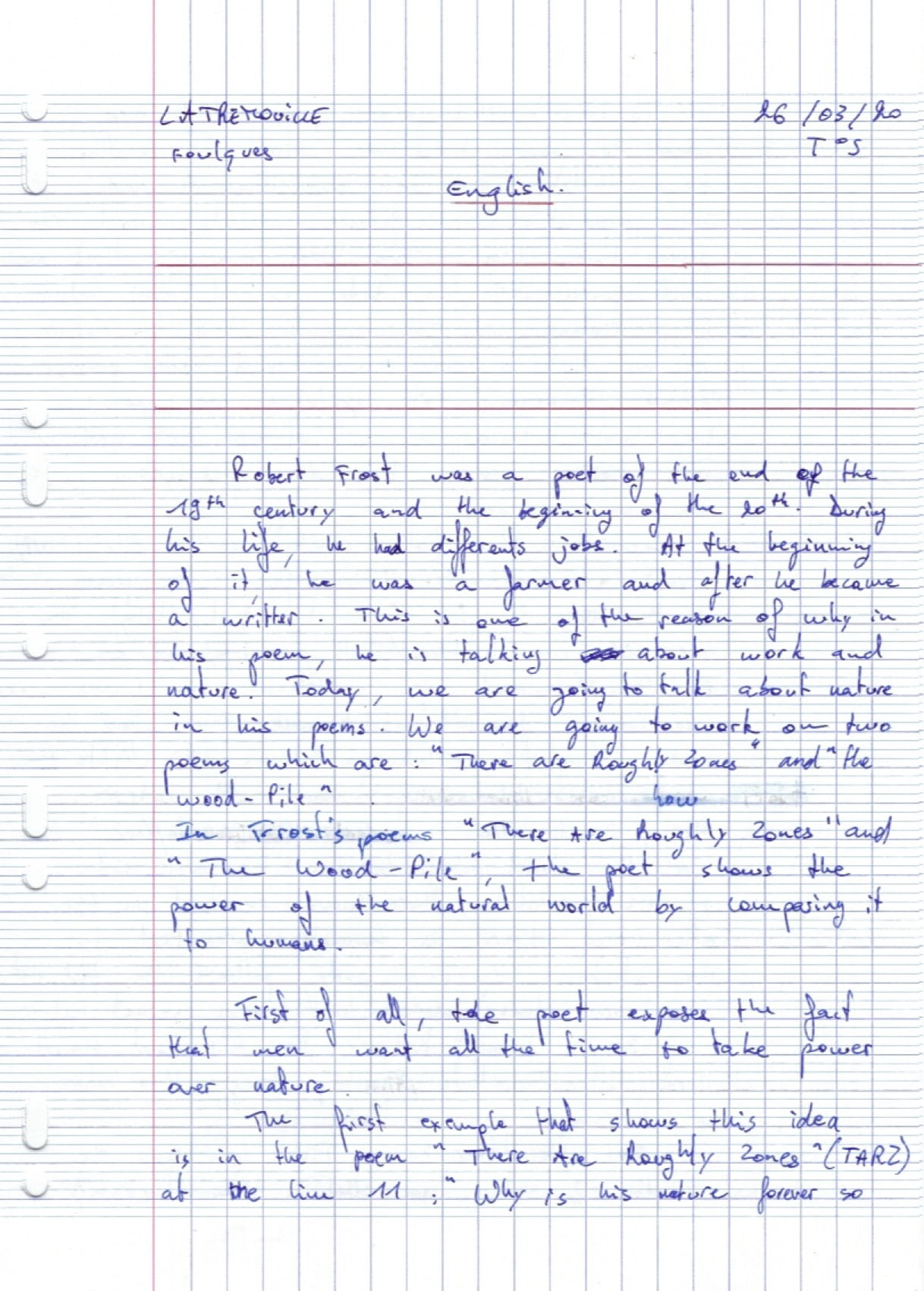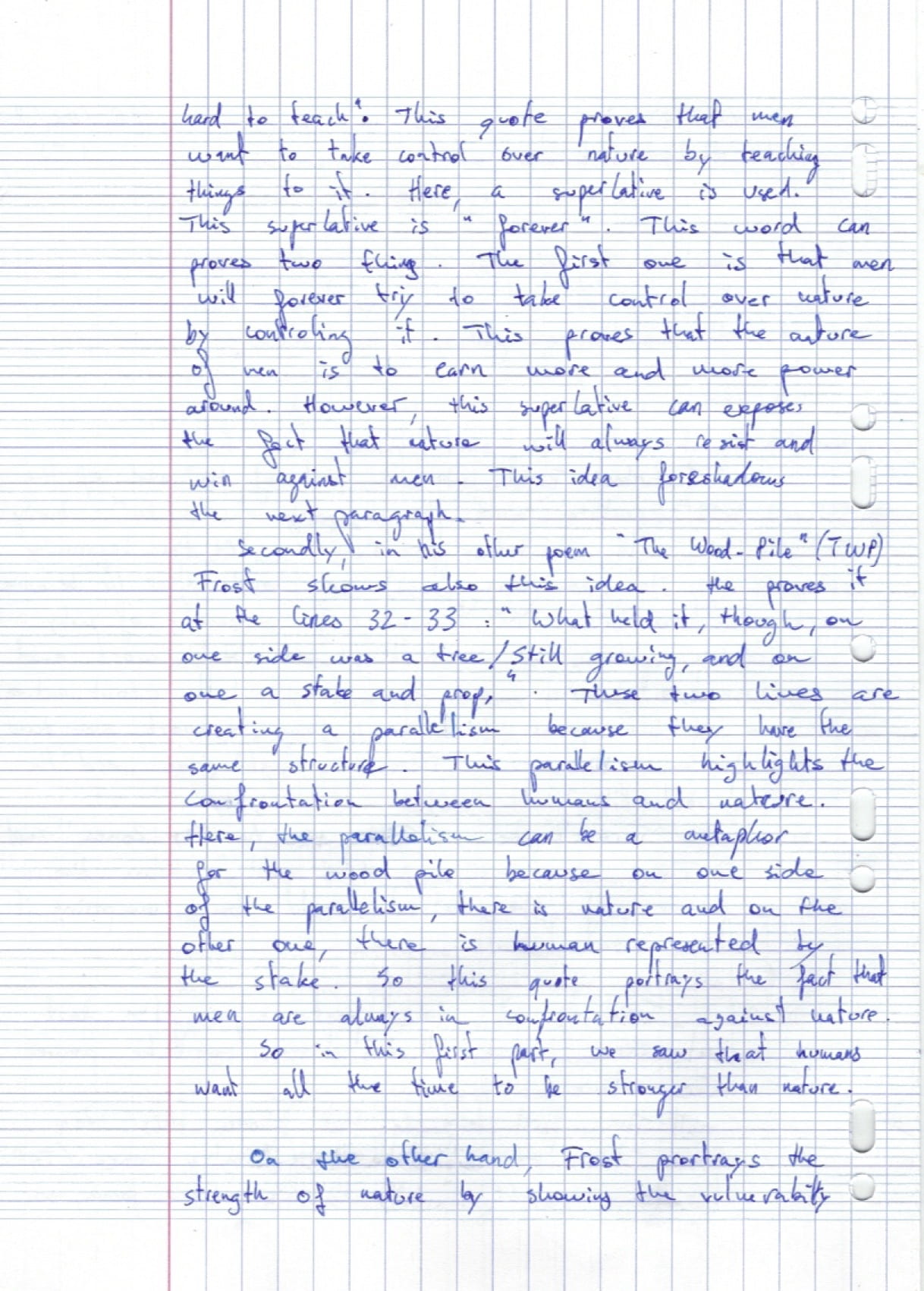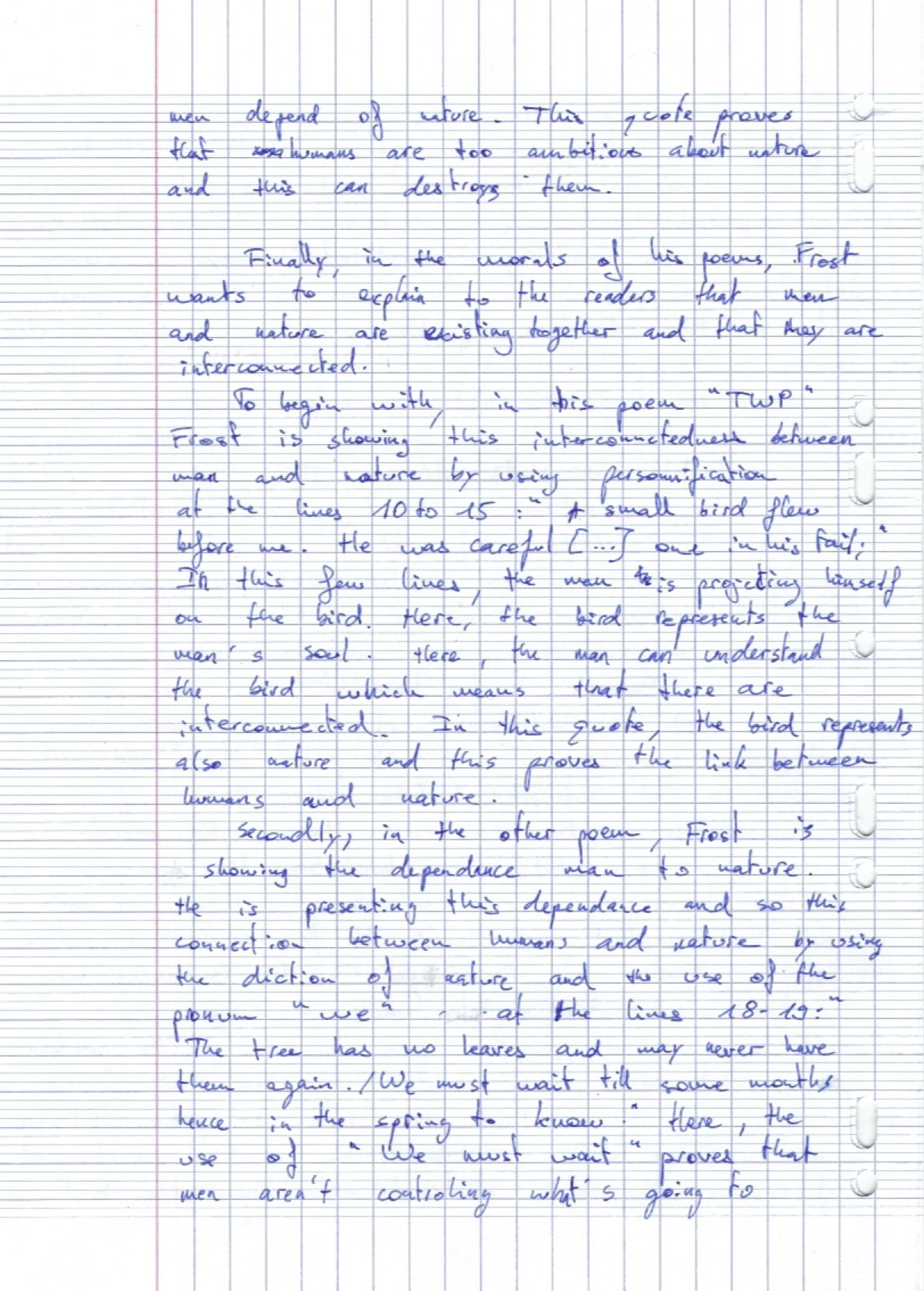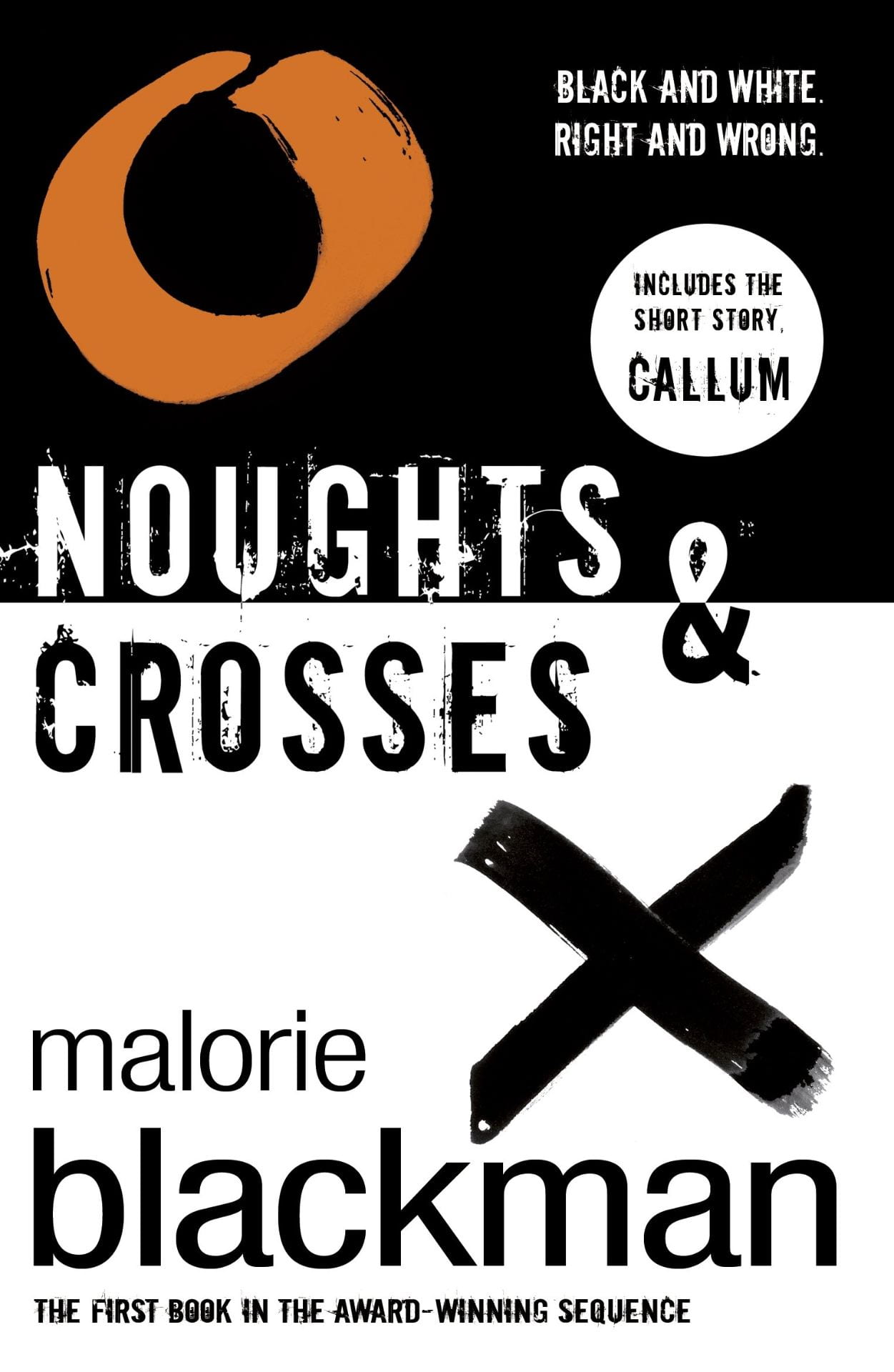1. Pablo
- b) Compare ways in which Frost presents work in two poems.
In Frost’s poems “Gathering leaves” the poet uses rhetorical question to reveal the fulfility of labour and in “After Apple Picking” rhyme and sensory imagery to reflect the narrator’s imperfect life through the activity and labour as a farmer and a poet.
***
Firstly in the poem “gathering leaves” the poet uses a rhetorical question in order to question to what extent labour is necessary and to show the fulfility of labour. Frost uses this rhetorical question in the middle of the poem to demonstrates the very present theme of work and labour that is in the center of the poem. “And what have I then?” (l.16): The rhetorical question awakes the sense of Pointlessness of his activity. But much more than just questioning what the narrator has from gathering leaves he questions himself on a more philosophical way: what if all result and what we gain from labour is in the end not fulfilling? The narrator here takes the example of gathering leaves: even though it’s the central topic of the poem it is only an example of how one’s activity can be strongly inscribed into the routine; thus, because everyone does it and because it has always been done, individuals gather leaves in their yard. The poem thus evokes and encourages the reader to question himself before doing an activity and not just do it out of pure “routine”. The poem also evokes, through this rhetorical question, the Human condition: Humans are automatically tempted to feel in control in order to feel purposeful; thus, they try to put order on nature by gathering leaves even though these leaves always come back. The narrator elicits an idea of “false productivity” bringing us to the the point where we ask ourselves “why do we gather leaves?”. Moreover at the end of the poem the narrator repeats the word “nothing” multiple times: the strong negation also underlines the idea of the frivolousness of gathering leaves.
On the other hand, the poem “After Apple Picking” gives a bit of a different image of labour than the poem “gathering leaves”. Here, the poet uses an imperfect rhyme scheme and sensory imagery in order to reflect the narrator’s imperfect life through the activity and labour as a farmer and a poet. Throughout the poem the imperfect rhyme scheme is very present: along with the empty barrel at the beginning of the poem (“And there’s a barrel that I didn’t fill” l.3) the poet creates a sense of emptiness; the void of the barrels here represents the narrator’s regrets. The regrets come along the lines of an imperfect rhyme scheme that thus represent an imperfect life. His labour of Apple-picking could here furthermore reflect Frost’s poetic work in the sense of him trying to make the perfect poet but didn’t make it. A perfect harvest is here thus symbol of a perfect poem, whereas he describes a poor harvest.
Additionally, linking to the empty barrel, the poem is also marked by a lot of sensory imagery once again reminding of the void in the narrator’s life: “And I keep hearing from the cellar bin the rumbling sound of load on load of apples coming in” (l.24-26). These quotes evoke an echo that could symbolize the echo of the narrator’s past: the repetitiveness of his task as a farmer (narrator in this case) or also as poet (Frost) are aroused by the kinesthetic imagery. In the poem “gathering leaves” the poet describes the uselessness of his activity/labour whereas in this poem the narrator describes his life through labour.
However there are important links between the two poems that need to be elaborated. Firstly both poems put into value the question about the repetitiveness of one’s act and labour: in “After Apple Picking” and through its kinesthetic imagery the narrator describes the repetitiveness of his activity as a farmer, the activity even haunting him in his dreams: “(…)what form my dreaming was about to take (…) my instep arch not only keeps the ache (…)” (l.17,21). In the poem “gathering leaves” the narrator analyzes the contemplation of value of all work asking when the repetitiveness of this useless act is going to stop (“again and again” l.14). The cyclic nature of leaf-fall is represented as the leaves themselves are of little value but the works involved is precious because of the cyclic nature of leaf-fall. While the leaves in this poem could represent the people’s acceptance as you can’t hold on to them (and leaves are not heavy so they fly away easily) and they fade quickly (acceptance loses its ability to make us feel good over time and leaves change colours quickly), the apples in the other poem could represent the fruit of one’s work: a badly written poem would represent a bad harvest.
Furthermore both poems give the reader a different sight of the world: in “After Apple Picking” the narrator looks at the world through ice, the diction of surreal here could represent how you can look at the world differently through poetry: “I am drowsing off” (l.8). In the poem “gathering leaves” the narrator pushes the reader to look at labour differently: he truly invites the reader to look at the relevance of one’s act before accomplishing it by routine giving us a different angle to look at things.
Lastly you could say that these two poems are “ two matching pieces” from all the works published by Frost. One may even say that they “complement” and complete each other: they evoke different topics, yet they seem to be bringing it back to One and fulfilling some kind of “moral” for the reader.
***
Thus the two poems “gathering leaves” and “After Apple Picking” are two poems completing each other amongst Frost’s poems. On one hand “gathering leaves” evokes the repetitiveness and pointlessness of some of our activities and thus of some labour and pushes the reader to elaborate on the true meaning of one’s act before committing it. On the other hand the poem “After Apple Picking” conjures admittedly the repetitiveness but more than that reflects on the narrator’s life and making an allusion between Frost’s poetic work and activity as a farmer. Together the poems form a wholesome exploitation of the theme of labour and work.
2. Adam (although his thesis statement is non-existant / FRENCHIFIED!)
Compare ways in which Frost presents work in two poems:
Frost lived his life as a farmer, but also as a poet. He had trouble choosing between the two professions that both satisfied him. This affected him very much, and we can feel this in his poems. This is important because it shows the hard work Robert Frost had to complete throughout his life. In fact, he had to wait 40 years before any of his poems were even recognised or appreciated by the public. In truth, this gives Robert Frost a very precise, but constantly evolving, opinion of work. In his poems, Frost oftens questions everything through the form of existential crises. Work is one of these particularly recurring themes, where the necessity, the use of work, and its positive or negative effects are discussed. So, In what ways different ways does Frost present work in his poems.
Firstly, we can see in his poem “Gathering Leaves” that the narrator presents work as obligatory, but unfulfilling with little or no results. In fact, we can see firstly observe this through the form, structure, and rhyme/rhythm of the poem. The ABCB rhyme structure with the shorter sentence (last verse of each stanza) makes the poem seem like a entertaining child’s tale, almost like a story. As well as this the very short stanzas, and the presence of structure contrasts Frost’s usual style of more free flowing verses. In fact, this makes the poem easy to read to easy to follow, as if once again it was addressed to a child. This firstly contrasts the actual information given in the poem which in turns makes work seem silly. As well as this, the idea of simplicity, present in the structure, but also in the vocabulary: “balloons”, “spoons”, “rabbit and deer”, etc”, makes us feel like he is talking to a child. This creates the concept of work as something obligatory, forced upon from the youngest of age. In the poem the author goes even further to describe work as a boring monotonous task. This is firstly observed through the use of comparisons and contrasts. “Bags full of leaves, are light as balloons” is at the same time a simili, a paradoxe, and a contrast between “full” and “light”. This firstly makes this line stand out. Here, the two verses are actually talking about work, and the fruits of work: an extended metaphor present throughout the poem. From this, we can deduce that Frost uses the simile to show how empty the fruits, or results of work are. The use of the paradoxe makes it seem very wise, and the presence of a hyperbole (leaves are not as light as air) makes it stand out even more. All in all, from this one line we can see that the narrator truly considered work as pointless. Furthermore, he goes on to describe what is is like for him “but the mountains i raise elude my embrace”. This seems to contrast the leaves as light as balloons, however here Frost is actually describing the effort this requires, which can be physical or moral. Once again the use of a hyperbole makes it stand out, but also creates a negative connotation. We can therefore see that Frost goes as far to say that not only work is pointless, but it is hard and unfavorable. Finally, Frost highlights the monotony of work, as well as the fact that it never ends. This can be seen when the narrator says “i may load and unload again and again” The repetition of terms and structure creates a strong sense of monotony. As well as this “Load” and “unload” create repetition, almost like a never ending loop, a vicious circle. We can therefore see that in “Gathering Leaves” Robert Frost portrays work as repetitive, never ending, and unfavorable.
However, Frost shows of work as very different in his poem “Mowing”. Here work is described as confusing, possibly in-understandable, but ultimately good. Firstly it is necessary to note the importance given to the scythe. The extended metaphor used on it to symbolise work makes it stand out more. As well as this the personification of it (“my long scythe whispered to the ground”) creates a sense of importance and necessity, as if it is what makes us human. This is further emphasised by the very gentle words used to describe such a dangerous and harsh weapon: “whispered” “love”, etc. This makes the scythe, and in consequence work seem like something, hard and maybe dangerous, but also calming and gentle. The use of this vocabulary makes it seem like it is used to calm someone. This gentleness is contrasted by confusion present throughout the poem. For example in line one we have “never a sound” “but one”. These contrast makes the reader question the niceness of this scythe and takes away attention from its love and glory. In fact, here we felt like work was positive, but the contradictions have made it unclear. This allows Frost to justify why work can sometimes seem so pointless. In fact, the touching aspect of the poem really highlights the reality of the struggle that work is. The use of very formal language, and even allusions to shakespeare shows how confusing this really is. Work is once again described as nice and caring in a very controlled environment, where rules controle work. This once again creates an unclear contrast of work as good, but also annoying. As well as this, the poem is extremely vague in its descriptions, using multiple allusions, once again reinforcing this concept. All of this is used to ultimately lead to two very important points Frost makes. The first is said in line 9: “anything more then the truth would have seemed to weak”. The paradoxe here makes the line stand out. This is helped by the alliteration of “the” which make the line flow very well. In fact, Frost here is leading us up the the climax of his poem. Through this line , longer then the others so it visually stands out, Frost concentrates the most important point of his poem. He once again does this in a confusing and contradictory manner through the paradoxe to really show that this conclusion is hard to find. Idealism in work is in fact an insult to real work. To frost work becomes more then the truth because it is a reality. Secondly, Frost goes on to mention a reward. This is very different to Gathering leaves because here work has a fruit. “and scared a bright green snake”. The potential religious allusion to the bible where the snake symbolises evil and temptation allows the author to give and image of work as salvatory. We can therefore see that in this poem Frost gives an image of work as important and as a savior, but also justifies its difficulty and its seemingly pointlessness through confusion, and misunderstandings. Work is good, although it may not seem like it.
We can therefore see that both poems are therefore very different. However, they do share similarities and shared opinions on work. In both poems, Frost agrees to the necessity of work. This can firstly be observed in Gathering Leaves at the very end where the narrator says “but a crop is a crop”. The presence of repetition of such a banal word reinforces the idea of work as monotonous. This references the rest of the poem and permits there to be a certain continuity in the narrator’s thought process. However, the word “but” also shows that he acknowledges that there is a greater a meaning of his work that he does not understand. This concept is much clearer in Mowing, which is contradictory because mowing is a much more confusing poem. We can therefore see that it is the conclusion Frost wants us to understand and remember. The vivid image of a bright green snake shows the seriousness and importance of work to chase it away (symbolises temptation and evil). Work permits us to rest in peace. We can therefore see, that although both poems give very different visions of work they both conclude on the idea of work as important, although not on the same level of clarity.
In conclusion, Frost presents work as difficult, useless, monotonous and boring with no real purpose in Gathering Leaves. However in both poems he also acknowledges that this opinion he has is particularly harsh and unfair. This acknowledgment is much clearer in Mowing where he justifies the harsh opinion of work by its confusing aspect. The justification of work is also present in Gathering leaves (although much less present). This really shows the questioning and existential crises Robert Frost has gone through on the topic of work. All in all, Frost presents work as necessary for a greater good, whether that may be on earth or not, or whether that may be whilst we are alive, or not…
3. Aidan
(B) Compare ways in which Frost presents work in two poems.
Throughout these two poems, Robert Frost uses the notion of paradoxal uselessness and tiredness inflicted from one’s labor to depict two different points of view regarding two different kinds of work.
Firstly, the concept of paradoxal uselessness is mostly represented in the first poem, Mending Wall, in which the speaker and his neighbour are working together to repair a wall. Although both characters are putting in hard work, the speaker is rather ironically involved as he can’t help but point out the frivolousness of what they are doing. On line 25 it says “My apple trees will never get across And eat the cones under his pines, I tell him” This ironic statement is used by Frost to show the meaninglessness of the separation. It is obvious that his apple trees won’t get across and eat the cones, but through this sardonic phrase, the speaker is somewhat legitimised and reckoned as rightful, whereas on the other hand, the neighbour, being at the other end of this statement, is now regarded as quite foolish and dull, not questioning his own opinions.Another example of this sense of meaninglessness in this same poem is on line 23: “There where it is we do not need the wall”. This outright statement justifies instantly the concept of paradoxal uselessness in this poem; the speaker is working hard to fix this wall but simultaneously is trying to justify the fact that this wall is not needed. It is also notable that, considering the fact that the poem contains 45 lines, this is the central line of the poem! Thus showing the reader how important and central this idea is to the whole poem, and only puts forth even more the notion of paradoxal fruitlessness.
Although this image of worthlessness is predominant in Mending Wall, it is still referenced in After Apple Picking. Only it isn’t the speaker’s work that is considered useless but rather the fruit of his work, quite literally! On lines 32 to 36: “For all That struck the earth […] Went surely to the cider-apple heap As of no worth.” In this scenario the speaker’s labour is fruitless! He condemns the bruised fruit so easily, defining them as worthless. But if the fruit of one’s work is useless, isn’t the work also useless? This is definitely paradoxal as the narrator is working hard, hard work that is not bearing any fruit, yet he keeps on working. Therefore, Robert Frost uses the concept of paradoxal uselessness to question the legitimacy of one’s work, exhorting others to question the same thing.
Secondly, the notion of tiredness is central to the second poem, if anything, the speaker’s hard work in After Apple Picking is defined by the tiredness and drowsiness inflicted upon him. Whereas the first poem was paradoxal due to the juxtaposition of work and uselessness, this poem shows can be described as paradoxal through the fact that the speaker’s hard work is inflicting this high degree of tiredness which can be compared to dearth. Working oneself to death?
This notion of tiredness is mostly depicted through the irregular structure and meter of this poem. On lines 14 to 15: “But I was well Upon my was to sleep before it fell”, Robert Frost very stylishly integrates a double meaning to this situation. The speaker begins by saying that he is “well” but is actually saying that he is “upon [his] way to sleep” Almost as if the speaker is delusional due to his over-tiredness. The strange pause mid sentence created by the enjambment can also represent the speaker’s need for a break, once again due to his hard labour. As stated previously the link between tiredness, sleep and death can be made quite easily. On line 41: “Long sleep, as I describe its coming on”, Frost uses this euphemism “long sleep” to ease the image of death or even regeneration. This image of death underlines the strange consequence of this hard work. Not only has it caused the speaker to be tired, but it might even kill him, creating a sense concrete reality.
The overall rhyme scheme throughout this poem is very unorganised and messy. This unorthodox approach creates of sense of slowness. With words only finding their rhyming pairs several lines later like “bough” (l.5) and “trough” (l.11), the reader is forced into a sense of slowness and drowsiness; it certainly makes the poem a lot slower than if the rhymes would have been consecutive. An interesting point is the fact that the longest gap between two rhyming words is between “heap” and “sleep” : 8 lines! And the word sleep is the last word of the poem. Almost as if the poem is slowing down, until it reaches the end. The end of the day? Of life? Was the hard work really worth such an imposing consequence ?
Therefore, Robert Frost uses the notion of tiredness to depict and question the legitimacy of one’s work if is bound to lead to death.
To conclude, Robert Frost uses the notion of paradoxal uselessness and tiredness inflicted from one’s labour to depict how he regards different kinds of work in different kinds of ways. If the work is useless; Frost won’t be afraid of proclaiming the fact that it is so. If the work is bound to inflict tiredness and death; Frost won’t be afraid to push that image to a darker place, comparing it to life, and questioning the legitimacy of the work, asking if it really is worth your life. It would be interesting to explore the links between this study and another one of Frost’s poem, namely The Wood Pile.
4. Foulques







